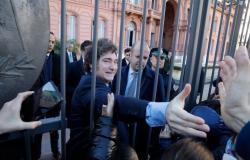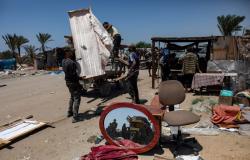
The far-right prime minister Giorgia Meloni clearly won the European elections in Italyobtaining 28.6% of the votes, according to the first results, and now wants to play a key role in the next community legislature, where the extreme right will gain more strength.
“Thank you, Brothers of Italy (FdI) is confirmed as the first Italian party, surpassing the result of the last political elections”, when it obtained 26%, Meloni wrote on his social networks along with a photograph with the victory sign.
With nearly 10% of the votes counted, his party is the winner of the elections ahead of the progressive Democratic Party (PD), with 25.70%, which maintains and even improves the latest forecasts, in its first elections under the leadership of Elly Schlein.
Meloni, the “star” of the campaign with whom both the right and the extreme right wanted to reach an agreement, must now reveal with these results, in line with the polls, if he offers his votes to the conservatives of the European People’s Party (EPP) and the outgoing president of the European Commission (EC), Ursula von der Leyenor if decides to bet on a pact with other far-right parties.
This was requested a few days ago by one of his political mentors, the Hungarian Prime Minister, Viktor Orbánwho urged a pact between Meloni and the French far-right Marine Le Pen as a “historic opportunity to change the majority.”
The Italian leads the group of the European Conservatives and Reformists (ECR, in its acronym in English), and Le Pen is running for Identity and Democracy (ID), but since coming to power, in October 2022, Meloni has shown great harmony with Von der Leyen, who openly extended her hand to him in the last electoral debate.
On an internal level, the rest of the Italian formations see how the results of Meloni, who presented himself as ‘fictitious’ candidate – since they will not go to Brussels – to show their strength at the polls after 18 months of Government, they are placed in the shadow of the prime minister.
The first electoral duel between Meloni and Schlein, who was also symbolically running as the head of the list, has ended with a better than expected result for the new opposition leader, who seems to have given some impetus to her formation.
The PD, in its first national elections with Schlein at the helm, achieved 25.70%, compared to 22.74% in the last European elections and less than 20% in the last general elections, when the party obtained its worst result.
The biggest setbacks have been suffered by the 5 Star Movement (M5S) of the former prime minister Giuseppe Contewhich has added 9.59%, very far from its 2019 results (17.06%), in addition to the League of the far-right Matteo Salvani, vice president of Meloni.
Salvini hoped to recover the ground lost in the last electoral events with his commitment to a candidate with homophobic and racist tendencies, General Roberto Vannacci, but it fell far short (8.62%) of the results in the previous European elections, when with 34.2% it became the party with the most votes and the leader of the Italian extreme right, which Meloni later took from it in the general elections of 2022.
Meloni’s other ally in the Government has fared better, the conservative Forza Italia (FI), a member of the EPP led by Antonio Tajanithe successor of the deceased Silvio Berlusconi: with 8.43% it remains in line with the 2019 Europeans (8.78%) and may be able to overtake the League.
And abstention reached historic highs in these elections, around half of the Italian electorate did not go to vote and, late at night, the registered participation figures remained around 49.5%.
(With information from EFE)





